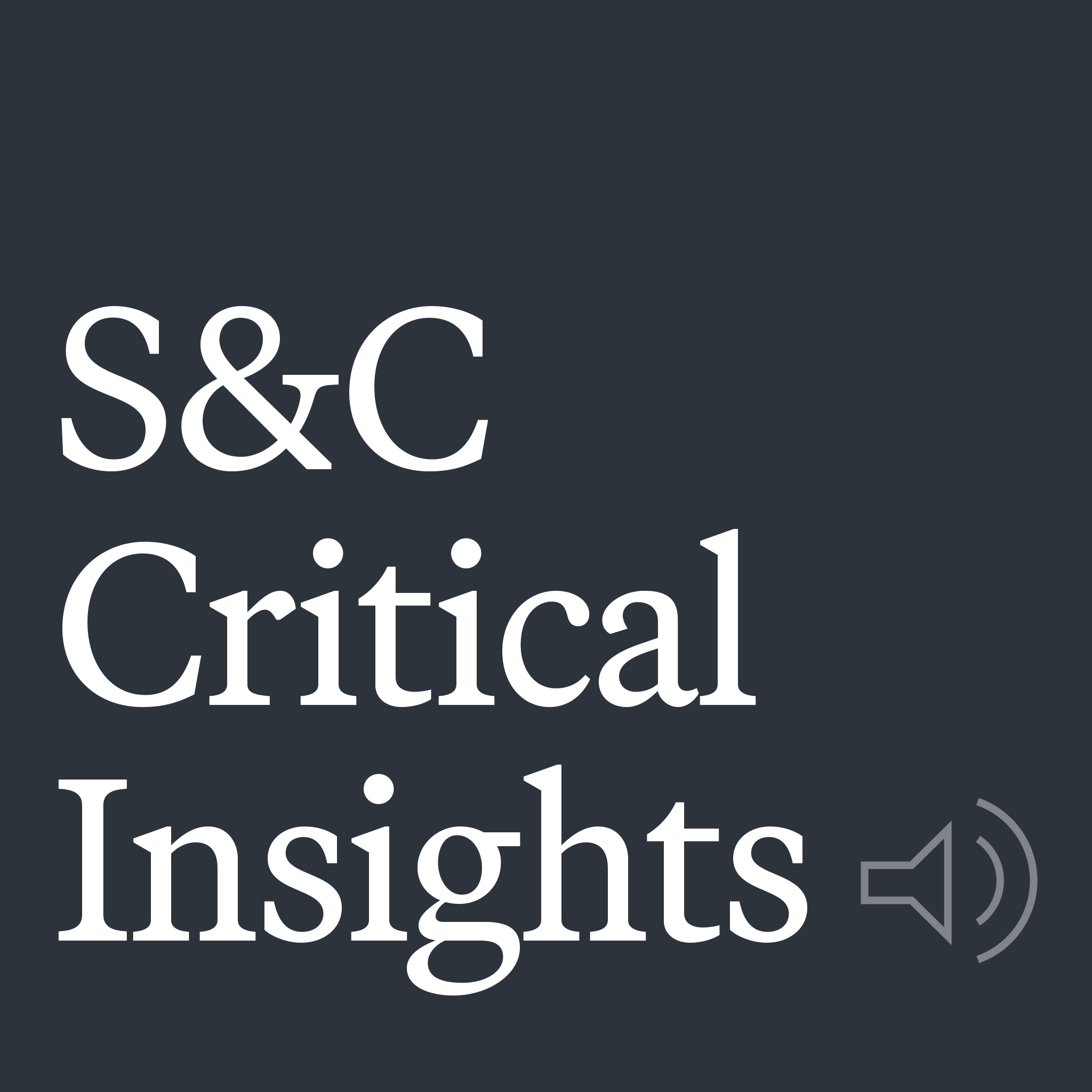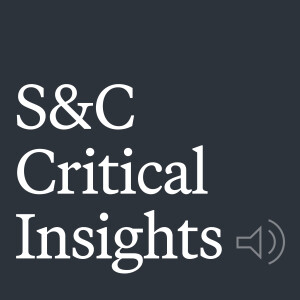
82.1K
Downloads
229
Episodes
Sullivan & Cromwell present the S&C Critical Insights podcast. Topics include M&A trends across industries, corporate governance including shareholder activism, litigation, arbitration, products liability, and more.
Sullivan & Cromwell present the S&C Critical Insights podcast. Topics include M&A trends across industries, corporate governance including shareholder activism, litigation, arbitration, products liability, and more.
Episodes

Tuesday Oct 08, 2024
Lessons from the 2024 Proxy Season, Part 1
Tuesday Oct 08, 2024
Tuesday Oct 08, 2024
In this episode of S&C’s Critical Insights, Corporate Governance Co-Head Marc Treviño analyzes significant trends and developments that emerged from the recent U.S. annual meeting proxy season.

Wednesday Sep 18, 2024
Key Takeaways for U.S. Companies Considering Cross-Border Investments
Wednesday Sep 18, 2024
Wednesday Sep 18, 2024
In this episode of S&C’s Critical Insights, Tony Lewis and Eric Kadel, Co-Heads of S&C’s National Security Practice, Sergio Galvis, Head of the Firm’s Latin American Practice and Inosi Nyatta, Co-Head of S&C’s Project Finance Group, discuss key takeaways for U.S. companies considering cross-border investments, especially in light of the new Treasury Regulations that prohibit certain outbound investments in sensitive technologies.

Tuesday Sep 10, 2024
An Update on the FTC’s Non-Compete Rule, Part 2
Tuesday Sep 10, 2024
Tuesday Sep 10, 2024
In this episode of S&C’s Critical Insights, Annie Ostrager, Co-Head of S&C’s Employment Law Group, and Jeannette Bander, a partner in S&C’s Executive Compensation Group, provide an update on the nationwide injunction against the FTC’s non-compete rule and discuss considerations for companies in light of this decision.

Wednesday Aug 28, 2024
Key Considerations for Boards in AI Governance
Wednesday Aug 28, 2024
Wednesday Aug 28, 2024
In this episode of S&C’s Critical Insights, Nader Mousavi, Co-head of S&C’s Artificial Intelligence Practice, and Jay Clayton, Senior Policy Advisor and Of Counsel to S&C, discuss key considerations for boards in their oversight of a company’s AI technologies and policies, and how to build an effective AI governance framework.
Boards should stay informed and be proactive, Nader and Jay note. With regulations around AI still evolving, having a robust governance framework can protect a company from potential legal issues and enhance a company’s reputation for responsible and ethical AI use.
Disclaimer: This is not legal advice.

Wednesday May 08, 2024
The New Proposed Federal Rule 16.1 and Its Implications for Multidistrict Litigation
Wednesday May 08, 2024
Wednesday May 08, 2024
In this episode of S&C’s Critical Insights, Bill Monahan, Head of S&C’s Products Liability & Mass Torts Group, and Shane Palmer, an associate in the Firm’s Litigation Group, examine the new proposed Rule 16.1 of the Federal Rules of Civil Procedure, which the Judicial Conference of the United States’ Advisory Committee on Civil Rules recently voted to adopt as the first rule governing multidistrict litigation. They discuss the original proposal for Rule 16.1 that was published last year, the defense and plaintiffs bars’ reaction to the proposed rule, and the final proposed rule that was adopted last month and its implications for MDLs.
Since Congress passed the Multidistrict Litigation Act in 1968 and created the MDL process, there have been no specific rules dictating how judges should manage MDLs, beyond the Federal Rules of Civil Procedure that apply in every federal civil case.
In 2017, the Advisory Committee established an MDL Subcommittee to consider whether new rules should be added to address the unique challenges of MDLs. Rule 16.1, which is designed to guide MDL courts in addressing the various and complex issues unique to MDL proceedings, is the first proposed rule to come out of the MDL Subcommittee’s efforts.

Wednesday May 01, 2024
An Update on the FTC’s Non-Compete Rule
Wednesday May 01, 2024
Wednesday May 01, 2024
In this episode of S&C’s Critical Insights, Annie Ostrager, Co-Head of S&C’s Labor & Employment Group, and Jeannette Bander, a partner in S&C’s Executive Compensation Group, provide an update on the FTC’s final rule containing a sweeping ban on non-compete agreements.

Friday Apr 19, 2024
A Discussion of Non-Compete Agreements and Their Enforceability
Friday Apr 19, 2024
Friday Apr 19, 2024
In this episode of S&C’s Critical Insights, Annie Ostrager, Co-Head of S&C’s Labor & Employment Group, and Jeannette Bander, a partner in S&C’s Executive Compensation Group, discussed non-compete agreements and the evolving nature of their enforceability, including developments at the federal and state level.

Thursday Apr 11, 2024
Major Developments in National Security Enforcement, Part Three
Thursday Apr 11, 2024
Thursday Apr 11, 2024
In this episode of S&C’s Critical Insights, Sharon Cohen Levin, Craig Jones and Eric Kadel, Co-Heads of S&C’s National Security Practice, Adam Szubin, Of Counsel in S&C’s National Security Practice, and Andrew DeFilippis, Special Counsel in S&C’s National Security Practice, continue their discussion of significant developments in national security enforcement.

Thursday Mar 28, 2024
Major Developments in National Security Enforcement, Part Two
Thursday Mar 28, 2024
Thursday Mar 28, 2024
In this episode of S&C’s Critical Insights, Sharon Cohen Levin, Tony Lewis and Eric Kadel, Co-Heads of S&C’s National Security Practice, Adam Szubin, Of Counsel in S&C’s National Security Practice, and Andrew DeFilippis, Special Counsel in S&C’s National Security Practice, continue their discussion of significant developments in national security enforcement.

Thursday Mar 21, 2024
Thursday Mar 21, 2024
In this episode of S&C’s Critical Insights, Annie Ostrager, Co-Head of S&C’s Labor & Employment Group, and Kamil Shields, a partner in S&C’s Litigation Group, discussed recent developments in whistleblower enforcement investigations and new whistleblower programs.
Annie and Kamil cover the increase in enforcement actions and investigations into employment and other agreements that the SEC and other regulators view as potentially impeding, preventing or discouraging whistleblower activity. They also discuss new programs aimed at further incentivizing whistleblower reporting to the government, such as the Whistleblower Pilot Program created by the United States Attorney’s Office for the Southern District of New York.
